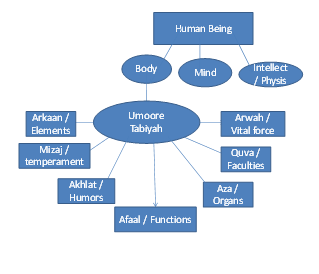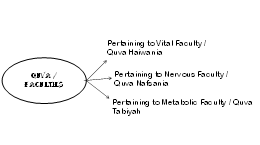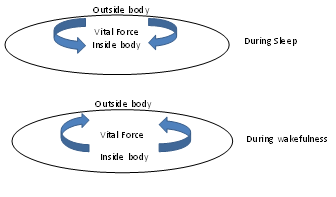Contemplating Sleep and its Related Disorders in the Perspective of Unani Tib
- 1. Department of Tahaffuzi wa Samaji Tib, Aligarh Unani & Ayurvedic Medical College, India
Abstract
Sleep has been a daily part of our life; we spent almost third of our life sleeping. Even with the growth of scientific understanding about sleep, ideas about it have varied from time to time. Unani Tib which is one of the ancient traditional systems of Medicine, whose roots can be traced back to Hippocrates, affirms the restorative theory of sleep. Balanced sleep and wakefulness is regarded as essential factors for maintenance of our health and well being. Hippocrates advocates the presence of an innate wisdom or self healing mechanism of body called Tabiat / Physis, which is responsible for bringing sleep, as during sleep body repairs and rejuvenate itself. Physis regulates the sleep in the same way as it regulates eating, drinking and breathing. Theories put forward by Unani Tib are very much in tune with present scientific findings. In state of wakefulness the vital force of the body is busy serving the Quva Nafsania / nervous faculty, but during sleep when it is at rest, it serves Quva tabia / metabolic and Quva Haiwania / vital faculty. Hence functions like protein synthesis, muscle growth, tissue repair, and growth hormone release occur mostly during sleep. Sleep exerts cooling and moistening effect on body and vital force which gets heated and dry owing to activity and movement during wakefulness, cools down and regains moisture after sleep. Tib recognizes two types of sleep disorders i.e kasrate naum / excessive sleep and the other one is kasrate bedari / excessive wakefulness. The former occurs due to excessive coldness and accumulation of moisture in the body where as latter occurs due to overheating and drying. This paper explores sleep and its effects on our body from perspective of Unani Tib as understanding these theories help deepen our appreciation of the functions of sleep for our life.
Keywords
• Unani tib
• Physis
• Quva nafsania
• Vital force
• Sleep
Citation
Jabin F (2015) Contemplating Sleep and its Related Disorders in the Perspective of Unani Tib. J Sleep Med Disord 2(1): 1012.
ABBREVIATIONS
OSAS: Obstructive Sleep Apnea Syndrome; CIMT: Carotid Intima Media Thickness; OSA: Obstructive Sleep Syndrome; IMT: Intima Media Thickness; CPAP: Continuous Positive Airway Pressure; WBC: White Blood Cells
INTRODUCTION
Unani Tib may be defined as that system of Greek Medicine which was developed during Arab civilization. It is based on the fundamentals given by Hippocrates, Galen, Razi and Avicenna. Its principles and theories are comprehensive enough to understand and satisfy arguments for most advanced and up to date theories. The essential constituents and working principles of the body are classified into seven main groups i.e Umoore Tabiah (i) Arkaan (ii) Mizaj (iii) Akhlat (iv) Aza (v) Rooh (vi) Quva and (vii) Afaal. Their actual manifestations in the working body are in above order (i) Arkaan or elements - comprising the different states of matter and the materials getting into composition of everything in the universe including human body. These are earth(cold and dry), fire( hot and dry), water (cold and wet), and air(hot and moist) (ii) Mizaj or bodily temperaments, These are Sanguinous (hot and moist), melancholic (cold and dry), Bilious (hot and dry), Phlegmatic (cold and moist) (iii) Akhlat –The structural components or humors (iv) Aza -The fully grown organs (v) Arwah –The breath of life or vital force (vi) Quva – the powers or faculties. (Quva haiwaniah / Vital faculty- pertaining to circulatory system , Quva tabiah / Metabolic faculty- pertaining to digestive and reproductive system, Quva Nafsania / Psychic faculty – pertaining to nervous system) (vii) Afaal -The functions (Figure 1 & 2)
Figure 1: Constituents and working principles of human body
Figure 2: Classification of Faculties
Matter in its different states and forms of existence helped by the temperaments of its individual constituents produces akhlat , the structural components of the body .Their different components combine to produce organs ,and Rooh – vital force. The organs with the life force develop energies or faculties – The Quva , which is made to manifest itself in afaal – functions of body [1]. According to Hippocrates Umoore Tabiah is driven by Tabiat / Physis. It is body’s innate vital force, and self healing mechanism which helps to maintain body’s equilibrium so allowing proper functioning of the cells, tissues and organs [2].
Restorative power of sleep and rest was recognized long ago by physicians of Unani Tib. Sleep is an essential aspect of human life. Sound, peaceful sleep permits physis to work in undisturbed manner and restore the body’s harmony. Unani Tib advocates the balance in six essential factors, also known as lifestyle factors, to remain healthy. Balance between sleep and wakefulness is essential for normal functioning of human body. Zakaria Razi stated that natural sleep, which is an indication of health, is defined as a condition when tired mind (heated and dry), after consumption of proper diet is relaxed by moist vapors reaching to the brain, and mind totally disconnects itself from sensory and motor functions which comes under the purview of psychic faculty/Quwa Nafsania [3]. According to Ibn Hubl Baghdadi natural sleep is a condition when nervous faculty retracts itself from exterior of the body to inwards and leave off sensory and motor functions of the body.And purpose of sleep is to give rest to nervous faculty [4].
Sleep has cooling and moistening effect, whereas wakefulness exerts dry and hot effect on whole body. During wakefulness vital force /Ruh is continuously dissipated and faculties weakens owing to physical and mental activities. Sleep directs the vital force inwards and strengthens the physical, nervous and vital faculty and their related functions. Sound sleep provides uninterrupted opportunity to restore the balance, quantitatively and qualitatively of faculties and vital force /Ruh, and their related functions [4] (Figure 3).
Figure 3: Movement of Vital Force during sleep and wakefulness
Vital force is continuously maintained by breathing in state of wakefulness as well as sleep. During sleep breathing restores the normal balance of vital force and nourishes it. Proper continuous breathing is essential, while sleeping to revive and regenerate vital force. Disturbed or non continuous breathing during sleep will result in weakening of vital force, leading to weak faculties ultimately altered or improper functioning. Various studies linked to Obstructive Sleep Apnea Syndrome (OSAS), which is a sleep-related breathing disorder associated with the development of cardiovascular diseases and atherosclerosis, proves this fact. It has been reported that OSAS could impair endothelial function and worsen cardiovascular risk profile since childhood, [5] severity of OSAS is an important factor related with higher values of IMT and hence with a higher risk of atherosclerosis, [6] Systemic inflammation plays an important role in the development of cardiovascular complications in OSA patients and Inflammatory markers levels are correlated to cIMT in OSA patients [7]. Endothelial dysfunction after CPAP therapy in OSAS patients is reversible [8], this study also strengthens the theory of vital force.
Effects of sleep as envisaged by unani tib:
(i) Arrest the dissipation of vital force. (ii) It assists the metabolic faculty to accomplish its tasks. (iii) Bring nervous faculty into repose. (iv)Restores and renews faculties’ especially nervous faculty. (v). Moderate sleep brings about equilibrium in quality and quantity of humors [9]. (vi) Repairing and healing of damage done in physical, mental emotional and spiritual dimensions of body. (vii) Strengthening all natural functions, including digestion, metabolism, and memory, and mind. (viii) Various studies have proved that sleep is essential for effective cognitive functioning. Loosing even a few hours of sleep can have detrimental effects on a wide variety of cognitive processes such as attention, language, reasoning, decision making, learning and memory [10]. (ix) It has been reported that sleep bring about glymphatic clearance of metabolic wastes which are produced in awake brain [11]. (x) According to a study sleep affects level of growth hormones in adult men during eight hour sleep [12]. (xi) Elimination of residues of digestion (metabolites, by products, toxins) through liver, kidney and skin. (xii) There is some supporting evidence of the restorative function of sleep. The sleeping brain has been shown to remove metabolic waste products at a faster rate than during awaken state [13]. (xiii) Sleep strengthens number of natural functions such as, digestive process which it helps to complete and ready for bowel movement on awakening, Metabolic process that repair damage and restore well being and detoxification by assisting physical faculty and empowering vital force from the system. (xiv) Wound healing has been shown to be affected by sleep. Sleep deprivation hinders the healing of burns on rats. It has been shown that sleep deprivation affects the immune system. In a scientific study 20% decline in WBC count was reported in sleep deprived rats [14].
Stages of sleep as envisaged by unani tib:
Unani Tib describes three stages of sleep which are related to state of digestion and is identified on the basis of condition of pulse. There are four stages of digestion, first one in stomach, which propels its residue into intestine. Second one in liver which diverts its residue towards urine. Third in blood vessels and fourth in organ itself, residue of third and fourth stages are removed through skin and lungs.
I st Stage of Sleep: In this stage pulse is weak and small. Physical Faculty in order to procure digestion in perfect manner retracts innate heat /vital force inwards, and pulse becomes sluggish.
IInd Stage of Sleep: In this stage pulse becomes stronger and increases in volume. This stage starts after digestion is complete and innate heat/vital force starts moving towards exterior of the body.
IIIrd Stage of Sleep: In this stage pulse again becomes weak. As in this stage digestion is complete owing to aggregation of effete substances (residues of third and fourth stage of digestion), which now awaits evacuation by channels, only possible during waking state (physical movement and imperceptible perspiration).
These three distinct stages could not be differentiated on the basis of pulse examination if the sleeping person was fasting as nothing awaits digestion and pulse will remain slow and sluggish and become more so. As person wakens pulse steadily gains volume and swiftness until it reaches natural state for that person [15].
Quantity and quality of sleep:
There are individual differences regarding requirement of sleep. Sleep requirements vary according to the temperament of the person. Different age groups, physical or mental activity level also affects the amount of sleep needed. Children require more sleep than adults and so do women compared to men. In old age sleep requirement is more to overcome the dryness associated with age (Table 1)
Table 1: Different Temperaments and their Requirement for sleep,.
| Bilious temperament | 5-6 hrs minimum nightly |
| Melancholic Temperament | 5-6 hrs minimum nightly |
| Sanguinous Temperament | 6-7hrs minimum nightly |
| Phlegmatic Temperament | 8 hrs minimum nightly |
Different Temperaments and their Requirement for sleep [16]
Conditions to observe regarding sleep:
(1) Best sleep is moderate, proper time, excess must be avoided.
(2) It is harmful to sleep just after eating, as passage of food out of stomach is delayed. One should walk a little then sleep.
(3) Best time to sleep is when food has passed on from upper part of intestine and when flatulence and eructation have subsided.
(4) It also deleterious to go to sleep on empty stomach as it weakens faculties.
(5) Good quality of sleep achieved at night. Day time sleep should be avoided. Sleeping during the day brings about the diseases related to humidity and catarrhal states; lack of appetite and inflammatory conditions and fevers often appears
(6) Best posture in sleep is to lie on right side and then turn on to left. To sleep on back is not advised as waste accumulates in the tissues of back resulting in nightmares [17].
Disorder related to sleep can be classified into two
Imbalance in sleep and awaken state (Obesity, stress etc).
Disturbance of sleep (excessive sleep, excessive wakefulness etc)
Excessive wakefulness or insomnia is condition which is a result of excessive dryness or heat in the body, especially in the brains or the nerves. It is caused by dryness of weather and environment, spicy foods, excessive intake of meat, anxiety, stress, grief, depression, Tea coffee and the use of certain medication [18]. It is treated by providing remedies which have cold and moist effect on body, like a warm bath I hr before sleep. Bananas, figs, dates, yogurt and milk should be given. And 11 almonds, 2tsp poppy seeds, two cardamom pods soaked in 100 ml water .liquidize with 150 ml milk and drink 1 hr before going to sleep [18].
DISCUSSION AND CONCLUSION
In spite of decades of researches and scientific studies the question of why we sleep has been difficult to answer. Unani Tib which is holistic system of medicine recognizes sleep as essential factor for maintenance of health and well being of individual we all need sleep but our requirement for sleep varies according to temperament and age group of the individual. Unani Tib has described in detail the need, the function and effects of sleep on human body. It believes in the existence of physis, an innate drive of the body, which is responsible for maintaining the balance with in human body and it regulates the sleep in the same manner as it regulates hunger and breathing. Imbalance in sleep and wakefulness may result in various disorders as it disturbs homeostasis of the body, whereas disturbed homeostasis may lead to disturbance in sleep as insomnia or excessive sleepiness.
REFERENCES
1. Niamatullah S. Theories and philosophies of Medicine. (IHMMR). 1973; 83.
2. Bhika R. Philosophy of Tib Ibn Sina Institute of Tib, South Africa, 2009; 7.
3. Razi Z ,Kitab Al Murshid (urdu Translation), J.K. Offset Printers Delhi,2000;47
9. Gruner OC. A treatise on Canon of Medicine by Ibn sina, Luzac London. 1930: 416.
10. Diekelmann S. Sleep for cognitive enhancement. Front Syst Neurosci. 2014; 8: 46.
13. “Brain may flush out toxins during sleep”. National Institutes of Health. 2013; 25.
15. Gruner OC. A Treatise on Canon of Medicine by Avicenna, Luzac & Co 1930:315.
17. Tabri R, Firdaus al hikmat (urdu Translation) faisal publications, 2002; 91.
18. BhikaR. Mohamed N Learning with Tib ,your body, your personality , your responsibility, Ibn Sina institute of Tib south Africa 2006; 151.












































































































































